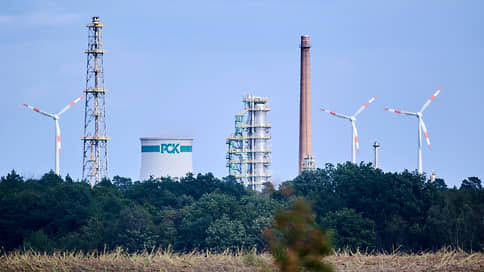Germany nefterpezh – Newspaper Kommersant No. 172 (7373) of 09/17/2022
[ad_1]

Berlin decided to take control of Rosneft’s oil refining assets in the country for six months, formally explaining this by the emerging threat to the security of energy supply. We are talking about minority stakes in two refineries and a controlling stake in the refinery in Schwedt, which is focused on deliveries through the Druzhba oil pipeline. Germany does not hide the politicization of the decision, calling the Russian Federation an unreliable supplier of energy resources: the day before, Russia stopped gas supplies via Nord Stream. According to lawyers, the transfer of control may be followed by the nationalization of the German assets of Rosneft.
German government ordered to transfer in the management of the oil refining assets of Rosneft to the state Federal Network Agency, the Ministry of Economy of the country reported. We are talking about two German structures of the Russian oil company – RN Refining & Marketing GmbH and Rosneft Deutschland GmbH, through which Rosneft owns shares in the Bayernoil refinery (Foburg an der Donau) – 28.57%, MiRO (Karlsruhe) – up to 24% and a controlling stake in PCK (Schwedt) – 54.17%.
Rosneft entered the German oil refining market back in 2011. Now the company is the third largest oil refiner in Germany with a market share of 12% (the volume of primary processing is more than 12 million tons), it provides about a quarter of the total oil imports to Germany (more than 20 million tons), including to its refineries. Rosneft’s key asset in Germany is the refinery in Schwedt, which is focused on deliveries via the Druzhba pipeline. Rosneft even planned to increase share in the refinery to 91.67%, having bought out the Shell package, the deal was approved by the German authorities on February 22, but after the outbreak of hostilities in Ukraine, its closure was not reported.
The formal reason for the current transfer of assets to trust management is that the ownership of shares in the refinery by Rosneft jeopardizes their economic activities.
According to the ministry, key providers of critical services such as insurance companies, IT companies and banks and customers are no longer willing to cooperate with Rosneft and its German enterprises. Since May of this year, Rosneft, along with Gazprom Neft, has come under blocking EU sanctions in connection with the hostilities in Ukraine.
German Chancellor Olaf Scholz recognized the decision to transfer control of the refinery as “political”; on September 13, he held talks with Russian President Vladimir Putin, but, according to him, the issue of transferring Rosneft assets was not discussed. “Russia, we’ve known this for a long time, is no longer a reliable energy supplier,” he said.
The statement about the transfer of control of Russian assets in Germany was made shortly after Gazprom completely stopped gas supplies to Europe via Nord Stream.
The transfer of control is based on paragraph 17 of the Energy Security Law and assumes that the shareholder (Rosneft) is temporarily unable to exercise its corporate rights, including giving instructions to management, and management, under the threat of criminal liability, cannot follow the instructions of the shareholder, the senior lawyer comments Delcredere Bar Association Nikita Tyurin. At the same time, the German Ministry of Economy can give management orders that are binding for execution and, if necessary, change management. So far, the measure has been set for six months and can be challenged by Rosneft in court, the lawyer notes. If the threats identified by the Ministry of Economy are not eliminated within six months, then the Ministry of Economy has the right to decide on the nationalization of companies in the manner prescribed by paragraph 18 of the Energy Security Law.
According to the German Ministry of Economy, “trust management counteracts the impending threat to the security of energy supply” in Schwedt. However, the possible reaction of the Russian Federation to the decision of the German authorities may strengthen this threat. Such fears on Friday, in particular, expressed the Prime Minister of Saxony, Michael Kretschmer. Rosneft did not comment on the transfer of control over German subsidiaries on Friday. The EU embargo on Russian oil, which is due to come into force at the end of the year, should not affect supplies via Druzhba. But, for example, after Gazprom Germania came under the guardianship of the German authorities in April, the Russian Federation imposed sanctions against this German structure of Gazprom. In the future, the German authorities expect to ensure the supply of oil to the refinery in Schwedt via alternative routes. Kommersant’s sources allowed the use of alternative routes, but doubted that they would allow the plant to be fully loaded.
[ad_2]
Source link





